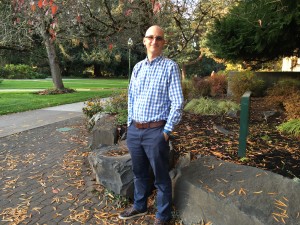 How are you connected to the LTS program?
How are you connected to the LTS program?
I teach courses on Korean and East Asian linguistics in the department of East Asian Languages and Literatures (EALL). LTS students who are interested in teaching East Asian language often take our courses as electives, and I sometimes advise LTS final projects. Also, we currently have two students who are doing concurrent MA degrees in LTS and Korean Linguistics and Pedagogy in EALL.
Are the classes you teach related to your own research?
Very much so! I’m interested in socio-cultural language learning and teaching, and I incorporate these perspectives into my second language acquisition and pedagogy classes, such as EALL 542 Second Language Acquisition of Chinese, Japanese and Korean and EALL 543 Chinese/Japanese/Korean Pedagogy. I also research multimodal aspects of politeness in Korean, which relates to my class EALL 586 East Asian Sociopragmatics.
What advice would you give to applicants who are considering a concurrent MA degree in EALL?
First, remember that the EALL deadline for grad admission is earlier than the LTS date (EALL January 1, whereas LTS is February 15)!
In your application it is really important to articulate a clear reason for wanting to do a concurrent degree and be a member of both programs. From our side, we really want to see a clear reason or goal for wanting to study Korean linguistics and pedagogy.
Many Korean students who apply to LTS focus on English language teaching (EFL), but some of them also become interested in teaching Korean. Why do you think this happens?
In Korea, the idea of foreign language teaching is focused so much on Koreans needing to learn English, and the awareness that people from other countries need to learn Korean is not so high. But coming here broadens student’s horizons. Korean students get to know about our strong Korean language program, and meet students who are learning Korean as a second language, possibly for the first time. They get to see the importance and value of Korean language education. Besides, even if you plan to become an English teacher, having experience of teaching your native language (Korean) will give you a different perspective on what it means to teach and learn a second language.
What do you enjoy about working with graduate students?
